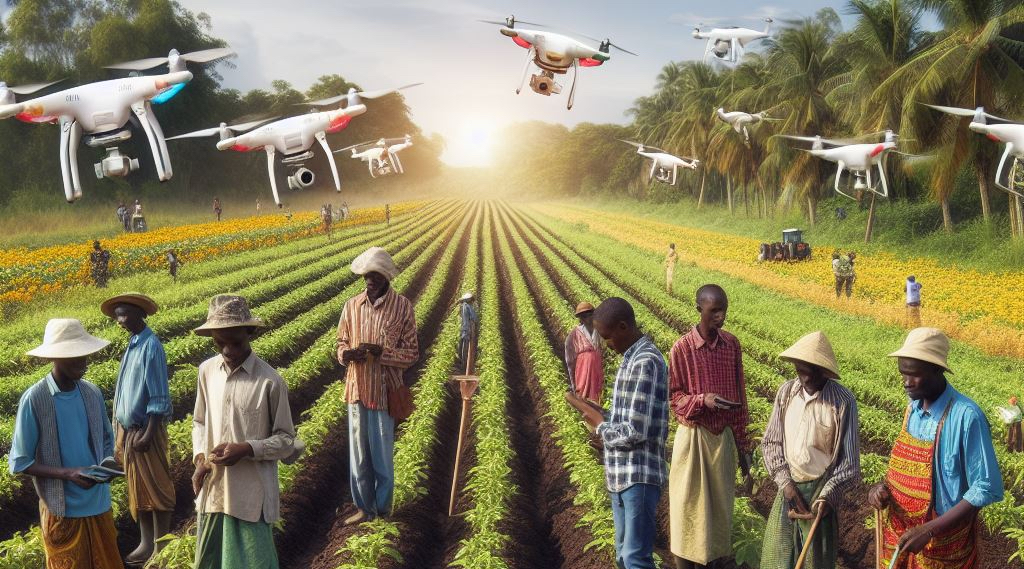Introduction: In recent years, technology has played an increasingly important role in transforming the agricultural landscape in Africa. With the continent facing challenges such as food insecurity, climate change, and limited access to resources, technology has emerged as a powerful tool for improving agricultural productivity, sustainability, and resilience. In this article, we will explore the ways in which technology is shaping agriculture in Africa and the impact it is having on farmers and communities across the continent.
The Impact of Technology: One of the key areas where technology is making a significant impact is in improving agricultural productivity. From precision agriculture and drone technology to advanced irrigation systems and crop monitoring tools, farmers are now able to optimize their operations and maximize yields. This has not only increased food production but also enhanced the efficiency of farming practices, allowing farmers to do more with less.
Another area where technology is driving change is in promoting sustainability in agriculture. With the growing focus on environmental conservation and sustainable practices, technology is being used to develop innovative solutions that minimize the environmental impact of farming. For example, the use of precision agriculture technologies can help reduce water usage and minimize the use of agrochemicals, leading to more sustainable farming practices.
Empowering Farmers: Technology is also empowering farmers by providing them with access to information and resources that were previously unavailable to them. Through mobile applications and digital platforms, farmers can now access weather forecasts, market prices, agricultural best practices, and financial services. This access to information is helping farmers make more informed decisions and improve their overall farming practices.
Furthermore, technology is also enabling farmers to access markets more efficiently. Digital marketplaces and e-commerce platforms are connecting farmers directly to buyers, eliminating middlemen and ensuring that farmers receive fair prices for their produce. This has not only improved the livelihoods of farmers but has also contributed to more efficient and transparent agricultural markets.
Challenges and Opportunities: While technology holds great promise for transforming agriculture in Africa, there are also challenges that need to be addressed. These include issues related to access to technology, digital literacy, infrastructure, and the affordability of tech solutions. Additionally, there is a need for policies and regulations that support the adoption of technology in agriculture and ensure that its benefits are equitably distributed.
Despite these challenges, the opportunities presented by technology in agriculture are immense. With the right investments and policies in place, technology has the potential to revolutionize agriculture in Africa, making it more productive, sustainable, and resilient. By embracing technology, African countries can unlock the full potential of their agricultural sector and contribute to food security and economic development across the continent.
Article 2: “The Rise of Renewable Energy in Africa: Opportunities and Challenges”
Introduction: Africa is experiencing a rapid growth in the adoption of renewable energy technologies, driven by factors such as the need for clean and sustainable energy sources, declining costs of renewable technologies, and the continent’s abundant renewable energy resources. In this article, we will explore the rise of renewable energy in Africa, the opportunities it presents, and the challenges that need to be addressed for its continued growth.
The Growth of Renewable Energy: One of the key drivers behind the growth of renewable energy in Africa is the continent’s abundant renewable energy resources, including solar, wind, hydro, and biomass. These resources present a vast potential for generating clean and sustainable energy, which is crucial for meeting the continent’s growing energy demand while reducing its carbon footprint.
Additionally, the declining costs of renewable energy technologies, such as solar panels and wind turbines, have made these technologies more affordable and accessible. This has led to a surge in investments in renewable energy projects across Africa, ranging from large-scale solar and wind farms to decentralized off-grid solutions.
Opportunities for Development: The rise of renewable energy in Africa presents numerous opportunities for economic development, job creation, and energy access. By investing in renewable energy projects, African countries can reduce their dependence on fossil fuels, mitigate the effects of climate change, and create new opportunities for local industries and businesses.
Renewable energy projects also have the potential to improve energy access in rural and remote areas, where access to electricity is limited. Off-grid renewable energy solutions, such as solar home systems and mini-grids, can provide clean and reliable electricity to communities that are not connected to the main power grid, improving their quality of life and economic prospects.
Challenges and Solutions: Despite the opportunities presented by renewable energy, there are also challenges that need to be addressed. These include issues related to financing, policy and regulatory frameworks, technical capacity, and infrastructure. Additionally, there is a need for greater collaboration and coordination among stakeholders, including governments, the private sector, and civil society, to drive the growth of renewable energy in Africa.
To address these challenges, African countries need to develop clear and supportive policies and regulations that promote the deployment of renewable energy technologies. This includes measures to attract investment, streamline project approval processes, and create favorable conditions for renewable energy development.
Furthermore, there is a need for increased investment in renewable energy infrastructure and capacity building to ensure the successful implementation of renewable energy projects. This includes investing in research and development, skills training, and technology transfer to build local expertise and capabilities in the renewable energy sector.
Conclusion: The rise of renewable energy in Africa represents a significant opportunity for the continent to transition to a more sustainable and resilient energy system. By harnessing its abundant renewable energy resources and addressing key challenges, Africa can unlock the full potential of renewable energy to drive economic development, improve energy access, and combat climate change. With the right investments and policies in place, renewable energy can power Africa’s future and contribute to a more sustainable and prosperous continent.

